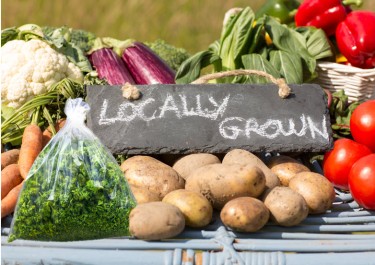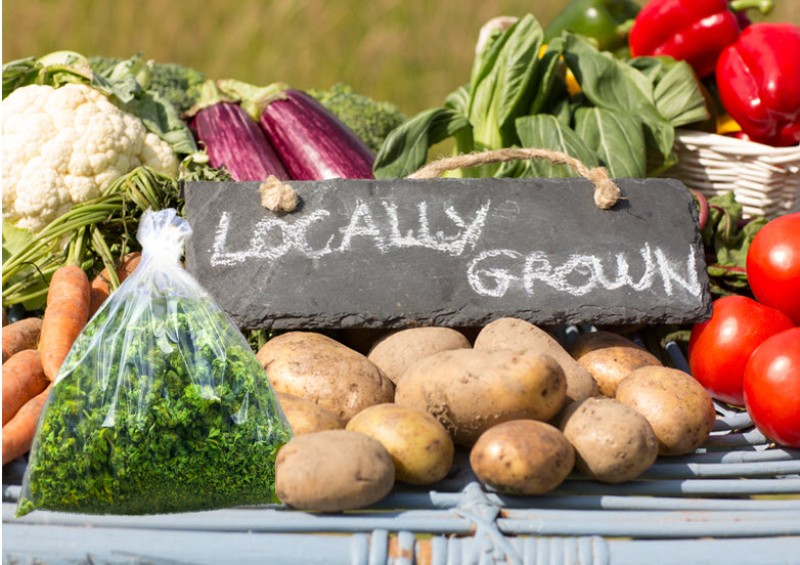
Should Cannabis Be Sold Directly To Consumers At Farmer’s Markets?
In almost every big city and town in the United States, you’re sure to find a farmer’s market.
Farmer’s markets are increasingly popular, and growing like weeds in cities across the nation. They are becoming recognized as the preferred way to shop for fresh produce that has been locally grown, with many seasonal fruits and vegetables on display. They benefit both the farmer and the consumer as it removes the middleman (supermarkets), enabling growers to turn a better profit and encouraging consumers to support local agricultural workers.
So aside from heirloom vegetables, it only makes sense that adult consumers should be able to purchase their marijuana from farmer’s markets too, right?
At the moment, that isn’t the case.
And marijuana farmers have been suffering, which is why it’s important to address this issue.
Last Tuesday, California’s Assembly Committee on Business and Professions approved new legislation that would allow consumers to purchase cannabis directly from farmers at markets. It would be a good move that would greatly benefit cultivators financially as they have been encountering serious financial problems for the first time since cannabis was legalized in the Golden State back in 2018.
On April 15th this year, wholesale prices dropped over 55% to $488 a pound, based on data from Cannabis Benchmarks, reports The Sacramento Bee. This is due to the ongoing cannabis glut.
While promising, the legislation still needs to go through many approvals and then wait for the governor’s green light before it gets finalized. However, this step has made many farmers happy. It would enable cannabis farmers to sell their ganja at 8 farmers markets annually.
“This is an important first step that will help our cash flow by being able to sell directly at farmer’s markets,” explains Kristen Callahan, who owns Magic Meadow Farms in Lake County. Callahan and others agree that it would be a great way to improve finances by allowing them to get paid for fees usually paid to dispensaries and other middlemen. Direct sales could also boost cannabis tourism in California, though that’s another story altogether.
There’s some backlash, as expected, from dispensary owners who are worried about the competition.
Legislative Loophole, Issues Caused By Glut
Even if cannabis is legal for recreational purposes in your state, it’s still illegal for cannabis farmers to do pop ups the way they do with produce.
This is a major legislative loophole that yet takes out more money from the very people who grow the weed. Why can’t we shake hands with the very person who grew our weed, and ask questions about how they grew it, the way we can with tomatoes and kale?
Besides, how else are farmers supposed to sell the excess cannabis that results from the existing glut?
California, as an example again, saw a drop in county tax revenues from legal cannabis in 2021 because of excessive overproduction without having enough legal retail shops to sell them to. Add to that the massive taxes imposed, legal farmers are struggling to compete with the low prices on the black market, where dealers can sell for as little as half the price of flower that you see in legal dispensaries.
Because of this, some farmers have no choice but to sell on the black market if they need to turn a profit.
Over a million pounds of cannabis make it to the legal market in California annually, but last year farmers had no choice but to leave them to rot. Imagine that, the United States’ most important medicinal crop – left to rot by the very people that grow them because they have no other way to sell it.
According to a Washington State University Study, which analyzed a sample of 88 farmers markets, they had sales of over $30 million, and all of this goes directly to the farmers themselves without having to pay fees to a middleman.
What Went Wrong?
That is the kind of money that cannabis farmers everywhere around the country can and should be enjoying. It’s bad enough that this year and the previous year were tough on the industry given the economic problems due to the pandemic; there was also lots of black market competition, disruptions in the supply chain, labor shortages, inflation, and high taxation on top of over supply. Both big and small cultivators are feeling the pinch around the United States.
According to an article by KCRW, this wasn’t what was imagined when Proposition 64 was legalized, resulting in the biggest legal cannabis market in the country. “When you go back and look at what the advocates of Prop. 64 said would happen and you look at their policy proposals, they clearly over-promised, they clearly chose not to follow best business practices and fundamentals in these promises,” said Dr. Keith Taylor, a professor at UC Davis who studies Prop. 64.
He thinks that small cannabis businesses will be struggling in the next two years, unless there are state reforms that are worked on immediately. “The clock is ticking,” he says. “I’m not saying that to over exaggerate. It absolutely is.”
While consumers who typically buy from dispensaries are currently enjoying the reduced prices, the farmers are really feeling it. It’s about time that the state legislators take this issue seriously; it’s become clear that enabling cannabis farmers to sell directly to consumers at farmers market is a solution. We just need the laws in place.
CANNABIS FARMERS IN A TOUGH SPOT, READ MORE...
CALIFORNIA CANNABIS FARMERS FIGHT TO STAY ALIVE, HERE IS WHY!








